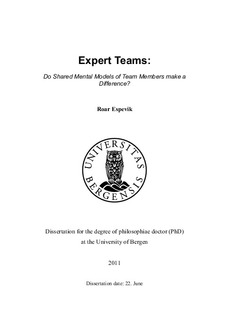| dc.description.abstract | The purpose of the present thesis was to investigate whether and how familiarity
influences coordination, resilience, and efficiency in high performance teams in safetycritical
organizations. Research has accumulated solid support for the general presumption
that shared mental models are associated with team effectiveness (see overview, Kozlowski
& Ilgen, 2006). Unfortunately, familiarity and shared mental models have seldom been the
subject of investigation. This is surprising since the importance of team members having a
shared understanding is underlined in dynamic situations that require high levels of
flexibility and adaptability in the team (Cannon-Bowers et al., 1993; Salas & Fiore, 2004).
The first study investigated whether knowledge about individual team members
would augment the effect of operational skills in predicting operational effectiveness in
trained expert teams. The second study investigated the consequences of shared mental
models (SMM) of team members in teams that are forced to coordinate their activities
towards a shared goal in a distributed team setting. The third study investigated whether
shared mental models of team members would transfer across new tasks or situations and,
through better coordination, result in improved efficiency and less physiological arousal.
Study 1 included samples from 24 active duty officers who made up four submarine
attack teams. Studies 2 and 3 included a total of 177 cadets from the Royal Norwegian Naval
Academy. The findings from these three studies indicate that familiar teams used
coordination strategies that enhanced efficiency. The coordination strategies used by familiar
teams are characterized by less overt communication (statements per minute) during high
workload (Study 1), a higher global anticipation rate (Study 2), and more adaptability and
back-up statements during cross-training (Study 3). In addition, familiar teams showed more
overt communication (e.g., confirmation) when confronted with a novel situation (Studies 2
and 3). Familiar teams outperformed unfamiliar teams, being more accurate, quicker and
achieving greater mission success (i.e., more hits). Familiar teams were more
physiologically aroused (HR) during low workload (Study 2), and less during high workload
(Study 1), recovery (Studies 2 and 3), and decreasingly so during training (Study 3).
These three studies extend previous research by presenting new empirical data on the
significance of shared mental models of team members. Study 1 demonstrated that
knowledge about team members (i.e., shared mental models of team members) adds to
performance over and above the contribution of operational skills (Aim 1). Studies 2
confirmed Study 1 (within teams) and provide empirical evidence for the effect of shared
mental models of team members in distributed teams (Aim 2). The findings from Study 3
suggest that shared mental models of team members are transferable across tasks and
enhance the effects of cross-training (Aim 3). All studies extend previous research, but
Study 3 in particular indicates that shared mental models of team members are distinctly
different from transactive memory systems (Aim 3). Hence, a shared mental model of team
members represents an independent, adaptive asset at team level that enhances team
performance and efficiency.
These studies are the first to provide empirical evidence in support of the notion that
shared mental models of team members are a mechanism that improves teams’ efficiency,
resilience, and coordination. This thesis confirms shared mental models of team members as
an important and independent construct with an added value in relation to team performance
and efficiency. It thus expands previous knowledge, where the focus has been on
equipment, tasks, and team interaction. The findings are a contribution to and fill an
important gap in the literature on Shared Mental Models. Implications are discussed for
training, staffing and safety issues in teams in safety-critical organizations. | nb_NO |
